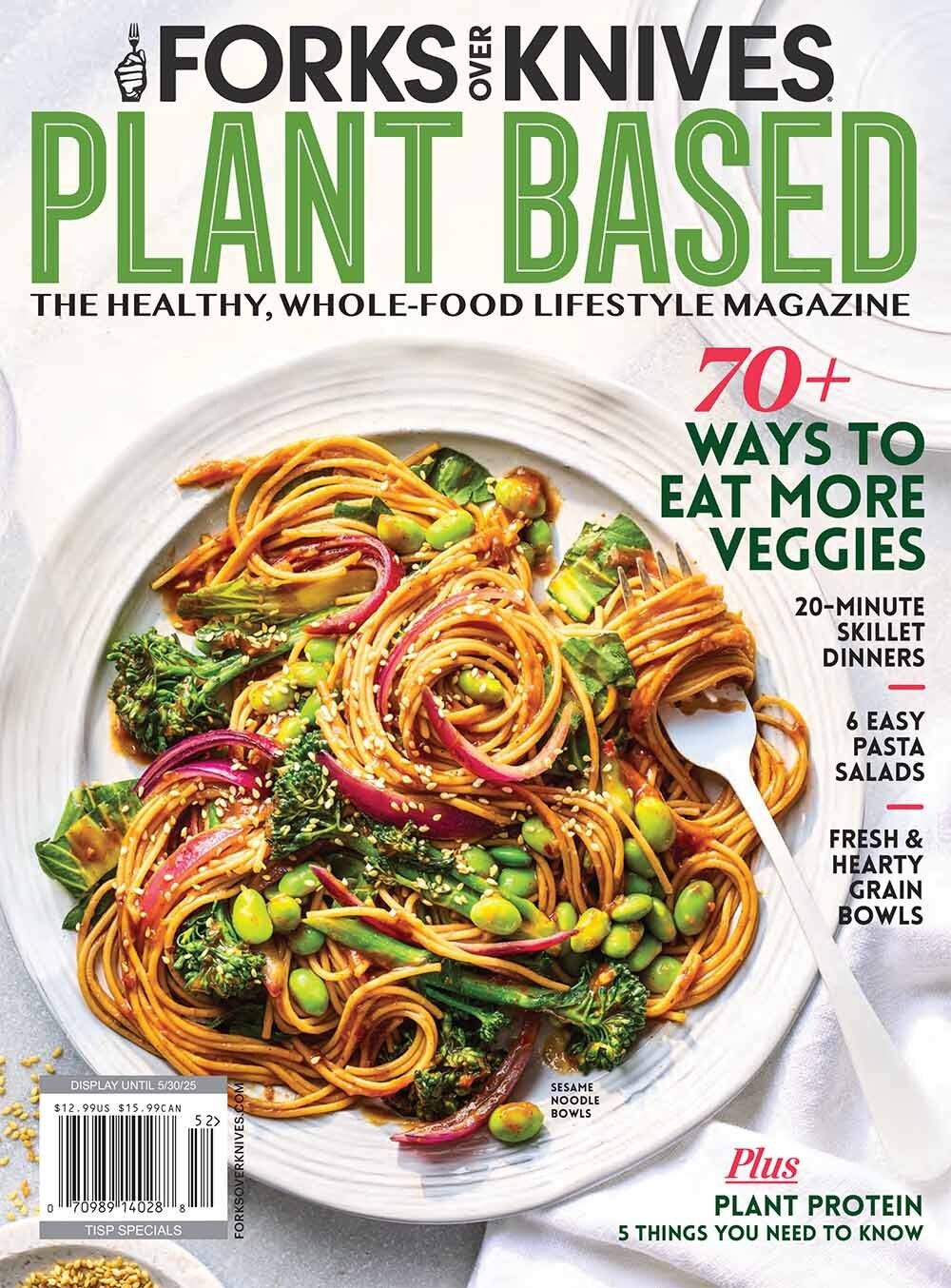
Plant-Based Diets Could Slash Sleep Apnea Risk by up to 29%, Study Finds
A healthy plant-based diet may be an effective tool for combating obstructive sleep apnea, significantly lowering the risk of the disorder and relieving symptoms for those who already have it, new research suggests.
In a study published last week in ERJ Open Research, researchers analyzed data from more than 14,000 people to evaluate whether the amount of plant-based foods versus animal-based foods in one’s diet could influence the risk of developing obstructive sleep apnea (OSA), a disorder in which the upper airway becomes partially or completely blocked during sleep. Left untreated, OSA can cause chronic sleep deprivation and raise the risk of heart disease, irregular heart rhythms, Type 2 diabetes, and other conditions.



The Spring 2025 magazine is here!
Our gorgeous “bookazine” features over 80 fresh and tasty recipes.
For the study, researchers used data from the National Health and Nutrition Survey (NHANES), a long-term project that collects diet and health information from participants on an ongoing basis.
The researchers scored each participant’s diet based on their reported intake of “healthy” plant-based foods, “unhealthy” plant-based foods, and animal-based foods. To isolate the impact of diet quality, the analysis adjusted for factors such as age, calorie intake, tobacco and alcohol use, and the presence of cardiovascular disease, cancer, and diabetes.
The Findings
The study found that participants who ate more “healthy” plant-based foods and more plant-based foods in general were 17% and 19% less likely to develop sleep apnea, respectively, compared with participants who ate fewer of these foods. The biggest difference was seen among male participants: Men whose diets were the most plant-based were 29% less likely to develop sleep apnea than those who ate the least plant-based.
While plant-based diets overall were associated with decreased sleep-apnea risks, participants who reported eating the highest amounts of unhealthy plant-based foods saw a 22% increase in risk.
In considering what might explain these trends, the study authors point out that low-fat, high-fiber plant-based diets have been linked to lower rates of obesity and inflammation. Excess body weight can increase pressure on upper airways, and obesity is a prime risk factor for obstructive sleep apnea. It’s estimated that 70% of people diagnosed with the condition are obese, and that 40% of obese people have sleep apnea.
Asked why the “healthy” plant-based diet appeared to confer slightly less benefit than the general plant-based diet, study author Yohannes Adama Melaku, Ph.D., said the modest difference might be attributed to several factors. “It's possible that the broader variety of foods in a general [plant-based diet] offers a wider range of nutrients and phytochemicals, which may contribute to this effect,” said Melaku. “Additionally, the way ‘healthy’ is defined in the hDPI [healthy plant-based diet index] might exclude certain plant foods that have beneficial properties for reducing sleep apnea risk.” (Notably, all of the plant-based foods deemed “unhealthy” were ultraprocessed foods except for one: potatoes. Because of their starch content, the hPDI lumps potatoes in with refined grains—but recent research is challenging that designation.)
Plant-Based Diets for Sleep Apnea: Mounting Evidence
The study adds to a growing body of evidence that a healthy plant-based diet may not only reduce the risk of developing sleep apnea but also help relieve symptoms in those who already have the disorder.
In a small interventional study published last year, 14 patients with OSA switched from a standard American diet to a whole-food, plant-based diet for three weeks; at the end of the study, participants reported reductions in sleepiness that were comparable to those seen with the use of stimulant medications commonly prescribed for OSA. The study authors speculated that this may be because WFPB diets are very low in saturated fat, which is abundant in the standard American diet and has been associated with daytime sleepiness.
A 2021 study of more than 9,000 participants found that people who reported eating fruit at least once a day were 26% less likely to suffer from OSA than those who reported eating fruit just three times a week or less. This was after adjusting for body mass index and other confounding variables. A review published earlier this month looked at available research on plant-rich diets and sleep and concluded that “plant-rich diets, characterized by their high fiber content, melatonin precursors, isoflavones and positive effects on the gut microbiome, hold promise in improving sleep quality and addressing sleep-related disorders, including OSA and obesity-associated sleep disturbances.”
It’s estimated that 30 million Americans have OSA, but only 6 million have been officially diagnosed. People suffering from OSA typically wake up multiple times every hour throughout the night, but they’re roused so briefly that they often have no recollection of it later on. Snoring and daytime sleepiness are hallmarks of the disorder, though some people will experience no noticeable symptoms. OSA is most often diagnosed through polysomnography (sleep study).
To learn more about a whole-food, plant-based diet, visit our Plant-Based Primer. For meal-planning support, check out Forks Meal Planner, FOK’s easy weekly meal-planning tool to keep you on a healthy plant-based path.

About the Author

About the Author
Courtney Davison
Join our mailing list
Get free recipes and the latest info on living a happy, healthy plant-based lifestyle.
By providing your email address, you consent to receive newsletter emails from Forks Over Knives. We value your privacy and will keep your email address safe. You may unsubscribe from our emails at any time.